
17 February 2025
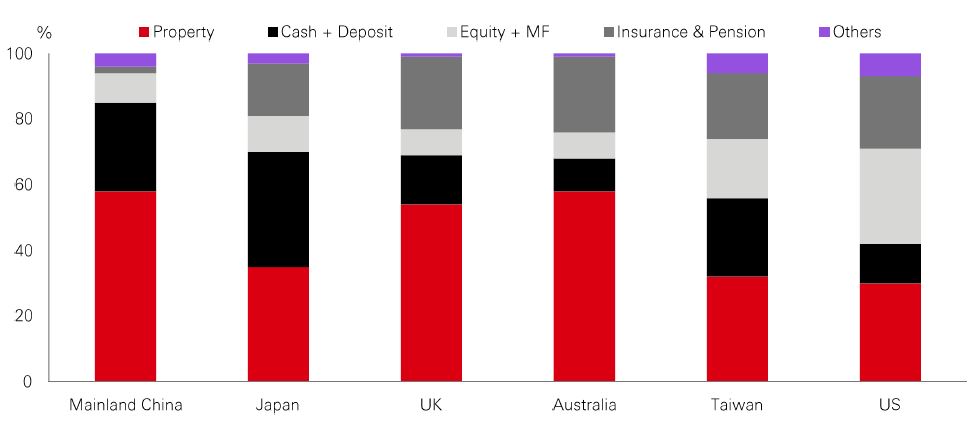
It’s been a good start to the year for investors in China’s stock market. The MSCI China index is already up over 9%, outperforming the wider EM index and the US. This follows a very good performance in 2024 as Chinese authorities’ ramp-up of policy support helped reverse a prolonged period of weak sentiment.
A big driver of recent gains has been a rally in China’s tech companies. The unveiling of DeepSeek late last month has triggered a reappraisal of the sector’s profits outlook and potential feedthrough to AI innovation and adoption in the country’s vast consumer market. Also, data on Lunar New Year spending has been strong, and is reflected in a higher-than-expected January CPI print.
Deep discounts versus global peers imply potential for large upside moves on better-than-expected news. After DeepSeek, there is potential for accelerated AI adoption across many industries. And last year’s late rally in the US dollar and big pick-up in global yields look to have run out of steam, boding well for the overall EM asset complex.
Nevertheless, with a big chunk of China’s household wealth tied up in property, the real estate slump remains a major challenge, and with it the threat of sustained deflation. Recent policy measures have helped stabilise the situation, but more demand-boosting stimulus will be required to keep growth on the right track and maintain positive momentum in markets. All eyes will be on next month’s National People’s Congress (NPC) meeting.
Elevated all-in yields and tighter spreads helped deliver a strong performance in Asian credit last year. And despite a recent pick-up in global policy uncertainty, macro tailwinds could make 2025 another strong year for the asset class.
Asian markets benefit from the twin-drivers of relatively high GDP growth and benign inflation. But there are other key themes, too. One is China’s continuing path to recovery. Its outlook hinges on navigating external headwinds and domestic imbalances with policies to boost domestic demand and cut industrial over-capacity. A clear pro-growth, pro-market policy stance could help – and we’re expecting more details on policy support in March. That ongoing stimulus could have spillover effects for the rest of Asia and provide a cushion from global headwinds.
Meanwhile, the region’s credit market also benefits from the strong growth, rising trade flows, and insulated nature of domestically oriented economies like India and parts of ASEAN, including Indonesia and the Philippines. These economies are less sensitive to global trade, making them potentially more resilient to external shocks.
The value of investments and any income from them can go down as well as up and investors may not get back the amount originally invested. Past performance does not predict future returns. For informational purposes only and should not be construed as a recommendation to invest in the specific country, product, strategy, sector, or security. Any views expressed were held at the time of preparation and are subject to change without notice. Any forecast, projection or target where provided is indicative only and is not guaranteed in any way. Source: HSBC Asset Management. Macrobond, Bloomberg. Data as at 7.30am UK time 14 February 2025.
US core CPI surprised to the upside, rising by 0.4% month-on-month in January. Some of the strength reflected outsized gains in some components – used car prices jumped 2.2% m-o-m, vehicle insurance rose by 2.0% m-o-m and airfares were up 1.2%. Strong demand for new and used cars in recent months – potentially in anticipation of tariffs – may be supporting prices and insurance premiums. Airfares look more like a case of a bit of noise in the data, what some economists have called ‘residual seasonality’. Absent these factors, core CPI would have risen by a more palatable, albeit still robust, 0.3% m-o-m. |
Luckily for the Fed, it targets PCE. The CPI data, when combined with the produce price release, has led economists to conclude that core PCE is likely to have risen by 0.2-0.3% m-o-m in January, following prints of only 0.1-0.2% in the previous two months. In that sense, while the Fed won’t be overly happy with the January inflation data, it will also want to see whether it follows the same pattern as recent years – a strong start that fades away. The bond market, having initially sold off in reaction to the CPI, has calmed down and largely reversed its losses.
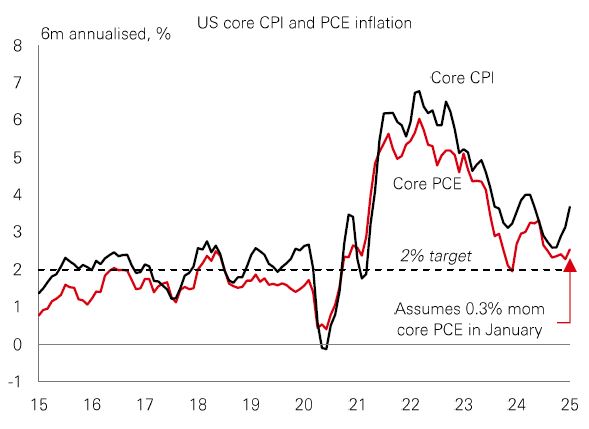
A key attraction of frontier markets is portfolio exposure to smaller, rapidly growing economies. According to the IMF, the average GDP growth rate for frontier economies is 4% over the next five years, well above 2.2% for the US, and 1.2% for the big-four eurozone economies. Vietnam – a big weight in the frontier index – has a well-documented structural growth story centred on attracting FDI amid the recent trend of global “friendshoring”. Bangladesh has become a key textiles exporter. But perhaps less talked about is the impressive growth now being seen in many West African nations, with Côte d’Ivoire, Niger, and Benin expected to grow in excess of 6% per annum over the next five years. |
A big part of this growth will be driven by recent hydrocarbon development, which brings with it a dependence on global energy prices. And regional politics remain difficult. Nonetheless these growth numbers signal a region with growing economic clout – supported by a young and growing population – and with it an emerging consumer base. As these economies mature, investor allocations and market liquidity are likely to increase.
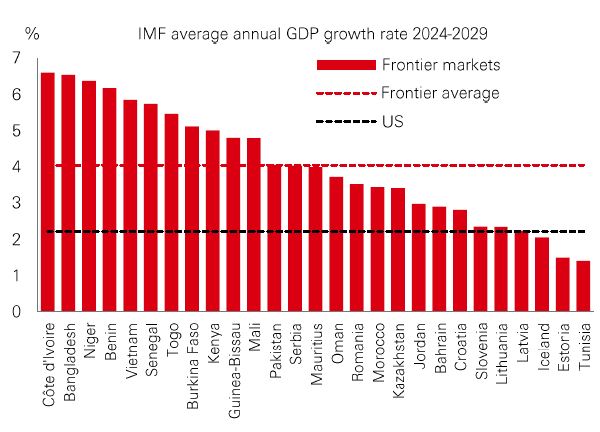
Mexico has found itself at the centre of a rise in global policy uncertainty recently. After regional political discussions in early February, volatility in the peso subsided, and the currency rebounded. That upbeat reaction spilled into the stock market, where equities saw a pick-up, and in sovereign bonds, where there was a modest fall in both two- and 10-year yields. |
However, volatility and investment uncertainty are expected to continue. In FX, the peso has room to depreciate to buffer any shock in terms of trade, and if so, financial authorities may intervene to secure orderly trading conditions without targeting any specific FX level. But peso weakness could pose upside risks to inflation and downside risks to economic activity. These factors are likely to shape policy direction from Mexico’s central bank. The base case view is that while Banxico is ready to decouple slightly from the Fed and cut rates by ~1.50% this year, the uncertain outlook could frustrate efforts.
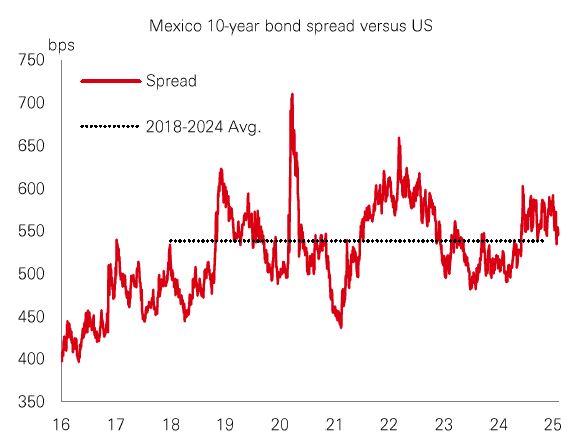
Past performance does not predict future returns. The level of yield is not guaranteed and may rise or fall in the future. For informational purposes only and should not be construed as a recommendation to invest in the specific country, product, strategy, sector, or security. Any views expressed were held at the time of preparation and are subject to change without notice. Any forecast, projection or target where provided is indicative only and is not guaranteed in any way. Index returns assume reinvestment of all distributions and do not reflect fees or expenses. Source: HSBC Asset Management. Macrobond, Bloomberg, Datastream. Data as at 7.30am UK time 14 February 2025.
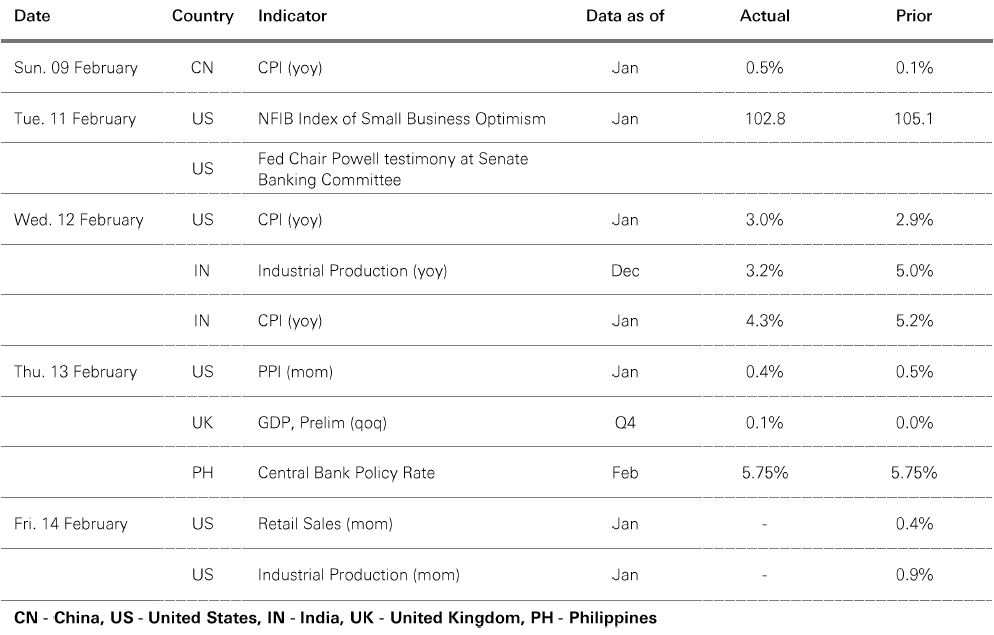
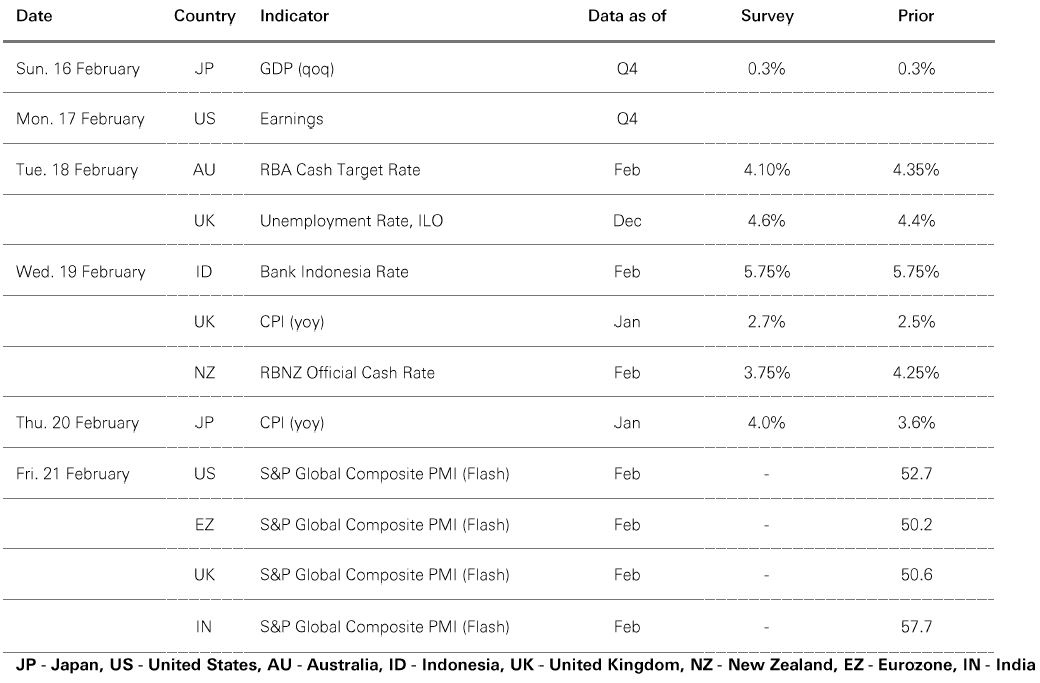
Source: HSBC Asset Management. Data as at 7.30am UK time 14 February 2025. For informational purposes only and should not be construed as a recommendation to invest in the specific country, product, strategy, sector or security. Any views expressed were held at the time of preparation and are subject to change without notice.
Global policy uncertainty continued to overhang risk markets, with the US DXY dollar index weakening. US Treasuries ended a volatile week modestly lower, underperforming Eurozone bonds and UK gilts following higher-than-expected US CPI data, as Fed Chair Powell reiterated that there is no urgency to cut rates. US equities rose, with the Russell 2000 lagging both the Nasdaq and S&P 500. The Euro Stoxx 50 index posted strong gains, bolstered by better-than-expected Q4 earnings, while the German DAX reached an all-time high. Japan’s Nikkei 225 performed well amid a weaker yen. Other Asian markets were mixed, with the Hang Seng leading the region amid optimism about the AI/tech sectors, followed by South Korea’s Kospi, and the Shanghai Composite also extended its rallies. However, India’s Sensex index fell. In commodities, gold and copper were on track to close higher, while oil finished a choppy week with moderate gains.




This document or video is prepared by The Hongkong and Shanghai Banking Corporation Limited (‘HBAP’), 1 Queen’s Road Central, Hong Kong. HBAP is incorporated in Hong Kong and is part of the HSBC Group. This document or video is distributed and/or made available, HSBC Bank (China) Company Limited, HSBC Bank (Singapore) Limited, HSBC Bank Middle East Limited (UAE), HSBC UK Bank Plc, HSBC Bank Malaysia Berhad (198401015221 (127776-V))/HSBC Amanah Malaysia Berhad (20080100642 1 (807705-X)), HSBC Bank (Taiwan) Limited, HSBC Bank plc, Jersey Branch, HSBC Bank plc, Guernsey Branch, HSBC Bank plc in the Isle of Man, HSBC Continental Europe, Greece, The Hongkong and Shanghai Banking Corporation Limited, India (HSBC India), HSBC Bank (Vietnam) Limited, PT Bank HSBC Indonesia (HBID), HSBC Bank (Uruguay) S.A. (HSBC Uruguay is authorised and oversought by Banco Central del Uruguay), HBAP Sri Lanka Branch, The Hongkong and Shanghai Banking Corporation Limited – Philippine Branch, HSBC Investment and Insurance Brokerage, Philippines Inc, and HSBC FinTech Services (Shanghai) Company Limited and HSBC Mexico, S.A. Multiple Banking Institution HSBC Financial Group (collectively, the “Distributors”) to their respective clients. This document or video is for general circulation and information purposes only.
The contents of this document or video may not be reproduced or further distributed to any person or entity, whether in whole or in part, for any purpose. This document or video must not be distributed in any jurisdiction where its distribution is unlawful. All non-authorised reproduction or use of this document or video will be the responsibility of the user and may lead to legal proceedings. The material contained in this document or video is for general information purposes only and does not constitute investment research or advice or a recommendation to buy or sell investments. Some of the statements contained in this document or video may be considered forward looking statements which provide current expectations or forecasts of future events. Such forward looking statements are not guarantees of future performance or events and involve risks and uncertainties. Actual results may differ materially from those described in such forward-looking statements as a result of various factors. HBAP and the Distributors do not undertake any obligation to update the forward-looking statements contained herein, or to update the reasons why actual results could differ from those projected in the forward-looking statements. This document or video has no contractual value and is not by any means intended as a solicitation, nor a recommendation for the purchase or sale of any financial instrument in any jurisdiction in which such an offer is not lawful. The views and opinions expressed are based on the HSBC Global Investment Committee at the time of preparation and are subject to change at any time. These views may not necessarily indicate HSBC Asset Management‘s current portfolios’ composition. Individual portfolios managed by HSBC Asset Management primarily reflect individual clients’ objectives, risk preferences, time horizon, and market liquidity.
The value of investments and the income from them can go down as well as up and investors may not get back the amount originally invested. Past performance contained in this document or video is not a reliable indicator of future performance whilst any forecasts, projections and simulations contained herein should not be relied upon as an indication of future results. Where overseas investments are held the rate of currency exchange may cause the value of such investments to go down as well as up. Investments in emerging markets are by their nature higher risk and potentially more volatile than those inherent in some established markets. Economies in emerging markets generally are heavily dependent upon international trade and, accordingly, have been and may continue to be affected adversely by trade barriers, exchange controls, managed adjustments in relative currency values and other protectionist measures imposed or negotiated by the countries with which they trade. These economies also have been and may continue to be affected adversely by economic conditions in the countries in which they trade. Investments are subject to market risks, read all investment related documents carefully.
This document or video provides a high-level overview of the recent economic environment and has been prepared for information purposes only. The views presented are those of HBAP and are based on HBAP’s global views and may not necessarily align with the Distributors’ local views. It has not been prepared in accordance with legal requirements designed to promote the independence of investment research and is not subject to any prohibition on dealing ahead of its dissemination. It is not intended to provide and should not be relied on for accounting, legal or tax advice. Before you make any investment decision, you may wish to consult an independent financial adviser. In the event that you choose not to seek advice from a financial adviser, you should carefully consider whether the investment product is suitable for you. You are advised to obtain appropriate professional advice where necessary.
The accuracy and/or completeness of any third-party information obtained from sources which we believe to be reliable might have not been independently verified, hence Customer must seek from several sources prior to making investment decision.
The following statement is only applicable to HSBC Mexico, S.A. Multiple Banking Institution HSBC Financial Group with regard to how the publication is distributed to its customers: This publication is distributed by Wealth Insights of HSBC México, and its objective is for informational purposes only and should not be interpreted as an offer or invitation to buy or sell any security related to financial instruments, investments or other financial product. This communication is not intended to contain an exhaustive description of the considerations that may be important in making a decision to make any change and/or modification to any product, and what is contained or reflected in this report does not constitute, and is not intended to constitute, nor should it be construed as advice, investment advice or a recommendation, offer or solicitation to buy or sell any service, product, security, merchandise, currency or any other asset.
Receiving parties should not consider this document as a substitute for their own judgment. The past performance of the securities or financial instruments mentioned herein is not necessarily indicative of future results. All information, as well as prices indicated, are subject to change without prior notice; Wealth Insights of HSBC Mexico is not obliged to update or keep it current or to give any notification in the event that the information presented here undergoes any update or change. The securities and investment products described herein may not be suitable for sale in all jurisdictions or may not be suitable for some categories of investors.
The information contained in this communication is derived from a variety of sources deemed reliable; however, its accuracy or completeness cannot be guaranteed. HSBC México will not be responsible for any loss or damage of any kind that may arise from transmission errors, inaccuracies, omissions, changes in market factors or conditions, or any other circumstance beyond the control of HSBC. Different HSBC legal entities may carry out distribution of Wealth Insights internationally in accordance with local regulatory requirements.
Important Information about the Hongkong and Shanghai Banking Corporation Limited, India (“HSBC India”)
HSBC India is a branch of The Hongkong and Shanghai Banking Corporation Limited. HSBC India is a distributor of mutual funds and referrer of investment products from third party entities registered and regulated in India. HSBC India does not distribute investment products to those persons who are either the citizens or residents of United States of America (USA), Canada or New Zealand or any other jurisdiction where such distribution would be contrary to law or regulation.
The following statement is only applicable to HSBC Bank (Taiwan) Limited with regard to how the publication is distributed to its customers: HSBC Bank (Taiwan) Limited (“the Bank”) shall fulfill the fiduciary duty act as a reasonable person once in exercising offering/conducting ordinary care in offering trust services/ business. However, the Bank disclaims any guarantee on the management or operation performance of the trust business.
The following statement is only applicable to PT Bank HSBC Indonesia (“HBID”): PT Bank HSBC Indonesia (“HBID”) is licensed and supervised by Indonesia Financial Services Authority (“OJK”). Customer must understand that historical performance does not guarantee future performance. Investment product that are offered in HBID is third party products, HBID is a selling agent for third party product such as Mutual Fund and Bonds. HBID and HSBC Group (HSBC Holdings Plc and its subsidiaries and associates company or any of its branches) does not guarantee the underlying investment, principal or return on customer investment. Investment in Mutual Funds and Bonds is not covered by the deposit insurance program of the Indonesian Deposit Insurance Corporation (LPS).
Important information on ESG and sustainable investing
Today we finance a number of industries that significantly contribute to greenhouse gas emissions. We have a strategy to help our customers to reduce their emissions and to reduce our own. For more information visit www.hsbc.com/sustainability.
In broad terms “ESG and sustainable investing” products include investment approaches or instruments which consider environmental, social, governance and/or other sustainability factors to varying degrees. Certain instruments we classify as sustainable may be in the process of changing to deliver sustainability outcomes. There is no guarantee that ESG and Sustainable investing products will produce returns similar to those which don’t consider these factors. ESG and Sustainable investing products may diverge from traditional market benchmarks. In addition, there is no standard definition of, or measurement criteria for, ESG and Sustainable investing or the impact of ESG and Sustainable investing products. ESG and Sustainable investing and related impact measurement criteria are (a) highly subjective and (b) may vary significantly across and within sectors.
HSBC may rely on measurement criteria devised and reported by third party providers or issuers. HSBC does not always conduct its own specific due diligence in relation to measurement criteria. There is no guarantee: (a) that the nature of the ESG / sustainability impact or measurement criteria of an investment will be aligned with any particular investor’s sustainability goals; or (b) that the stated level or target level of ESG / sustainability impact will be achieved. ESG and Sustainable investing is an evolving area and new regulations are being developed which will affect how investments can be categorised or labelled. An investment which is considered to fulfil sustainable criteria today may not meet those criteria at some point in the future.
THE CONTENTS OF THIS DOCUMENT OR VIDEO HAVE NOT BEEN REVIEWED BY ANY REGULATORY AUTHORITY IN HONG KONG OR ANY OTHER JURISDICTION. YOU ARE ADVISED TO EXERCISE CAUTION IN RELATION TO THE INVESTMENT AND THIS DOCUMENT OR VIDEO. IF YOU ARE IN DOUBT ABOUT ANY OF THE CONTENTS OF THIS DOCUMENT OR VIDEO, YOU SHOULD OBTAIN INDEPENDENT PROFESSIONAL ADVICE.
© Copyright 2025. The Hongkong and Shanghai Banking Corporation Limited, ALL RIGHTS RESERVED.
No part of this document or video may be reproduced, stored in a retrieval system, or transmitted, on any form or by any means, electronic, mechanical, photocopying, recording or otherwise, without the prior written permission of The Hongkong and Shanghai Banking Corporation Limited.